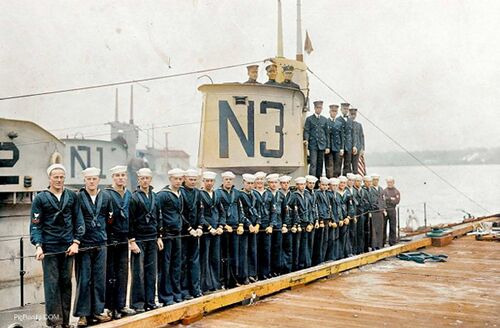N-3: Difference between revisions
Created page with "[[Category:]] File:Header 4 New.jpg File:Red bar sub new.jpg === <big>N-3 SS-55</big> === <div style="text-align: justify;"><span style="color:#00008B"> |left|500px|<center>Crew of teh USS N-3 seen in the post WW I photo. Probably c1920</center> <div style="text-align: justify;"><span style="color:#00008B"> USS N-3 crew. It is unclear if this or the photo above was taken first. In any rate they were taken with in minutes of each oth..." |
No edit summary |
||
| Line 4: | Line 4: | ||
=== <big>N-3 SS-55</big> === | === <big>N-3 SS-55</big> === | ||
<div style="text-align: justify;"><span style="color:#00008B"> | <div style="text-align: justify;"><span style="color:#00008B"> | ||
[[File:N-3-crew-1 color.jpg ||left|500px|<center>Crew of | [[File:N-3-crew on deck-2 color.jpg ||left|500px|<center>Crew of the USS N-3 seen standing on the deck of the N-3 post WW I. Probably c1920</center>]] | ||
The crew of the USS N-3 posing for camera at the Submarine Base New London in Groton, Conn circa 1919. We know the photo is post WW I due to the number of Overseas Service Chevrons sown on the left sleeve of mens jumpers. All men appear to be Petty Officers. | |||
The Army had adopted this from the British and began authorizing them for American Troops. Originally the Army sewed them, like the British with the chevron legs pointing up. Navy, upon adoption, sewed them with legs pointing down. This meant that the sailor had been deployed in the European Theater of Operations. If the stripe was sewn on the right sleeve it meant the person had been wounded due to enemy action. It was the equivalent to a Purple Heart and was later exchangeable for that medal and ribbon after 1937.<br> | |||
<small>National Archives Photo</small> | |||
[[File:Red bar sub new.jpg]] | |||
[[File:N-3-crew-1 color.jpg ||left|500px|<center>Crew of the USS N-3 seen in the post WW I photo. Probably c1920</center>]] | |||
<div style="text-align: justify;"><span style="color:#00008B"> | <div style="text-align: justify;"><span style="color:#00008B"> | ||
USS N-3 crew. It is unclear if this or the photo above was taken first. In any rate they were taken with in minutes of each other. A close study of the mens faces will show the same men in both photos. It is noted that all four of the chiefs have the Overseas Service Chevrons on their left sleeves, while the officers are wearing none meaning they were never deployed to Europe. If they had, the chevrons would be sewn just above the stars above their stripes. | USS N-3 crew. It is unclear if this or the photo above was taken first. In any rate they were taken with in minutes of each other. A close study of the mens faces will show the same men in both photos. It is noted that all four of the chiefs have the Overseas Service Chevrons on their left sleeves, while the officers are wearing none meaning they were never deployed to Europe. If they had, the chevrons would be sewn just above the stars above their stripes. | ||
| Line 12: | Line 20: | ||
<small>Photo in the Private collection of Ric Hedman<br> | <small>Photo in the Private collection of Ric Hedman<br> | ||
Thanks to Wolfgang Hechler for the possible CO Identification</small> | Thanks to Wolfgang Hechler for the possible CO Identification</small> | ||
</div> | </div> | ||
Revision as of 16:58, 12 June 2023
N-3 SS-55

The crew of the USS N-3 posing for camera at the Submarine Base New London in Groton, Conn circa 1919. We know the photo is post WW I due to the number of Overseas Service Chevrons sown on the left sleeve of mens jumpers. All men appear to be Petty Officers.
The Army had adopted this from the British and began authorizing them for American Troops. Originally the Army sewed them, like the British with the chevron legs pointing up. Navy, upon adoption, sewed them with legs pointing down. This meant that the sailor had been deployed in the European Theater of Operations. If the stripe was sewn on the right sleeve it meant the person had been wounded due to enemy action. It was the equivalent to a Purple Heart and was later exchangeable for that medal and ribbon after 1937.
National Archives Photo

USS N-3 crew. It is unclear if this or the photo above was taken first. In any rate they were taken with in minutes of each other. A close study of the mens faces will show the same men in both photos. It is noted that all four of the chiefs have the Overseas Service Chevrons on their left sleeves, while the officers are wearing none meaning they were never deployed to Europe. If they had, the chevrons would be sewn just above the stars above their stripes.
While waiting for definitive corroboration, it is believed that the commanding officer is Lieut. Francis Sanderson Craven in the middle of the front row. Names are still being researched for the other two. The back of the photo has the name "R. W. Nelson" written on it. Possibly one of the members of the crew. Without a crew list there is no way to know.
Photo in the Private collection of Ric Hedman
Thanks to Wolfgang Hechler for the possible CO Identification
Page created by:
Ric Hedman & David Johnston
1999 - 2023 - PigBoats.COM©
Mountlake Terrace, WA, Norfolk, VA
webmaster at pigboats dot com
